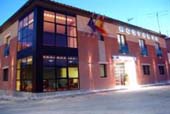For your visit to the Spanish city of Cuenca, you will hardly find a better place to stay than the Hostal Buenavista, which is ideal for both leisure and business guests, and perfect for touring this historic city. Offering non-smoking rooms, all with internet access, air-con, and TV, the Buenavista also has outdoor swimming pool, disabled facilities, twenty four hour reception and room service, and a choice of recreational and leisure facilities. Located in the Castilla-La Mancha region of Spain, Cuenca is one of the most highly visited cities in the region, seconded only by the magnificent Toledo, one of the finest cities in Europe. Popular as a day trip destination from Madrid, Cuenca will not disappoint those who choose to visit, whether it be to see the 12th century cathedral or the ruined Moorish castle. Rooms in the Hostal Buenavista are offered from just 52 euros per night (£43), for a great value stay in Cuenca. If you wish to get to the city from outside of Spain, you will need to use Madrid airport from where you can get a transfer, bus, train or even hire a car in order to travel the 130km to Cuenca. Madrid airport is of course served by most of the main United Kingdom airports, so getting a cheapish flight there should be easy. An alternative airport that you could use for Cuenca, is Albacete, which is about 50 kilometres away. To reach Cuenca by road you can use the A-40 from Madrid or other roads if you are travelling from a different direction.
September 10, 2010
July 28, 2009
The Spanish Town of Yecla
The town of Yecla lies on the borders of the provinces of Murcia, Alicante and Albacete amidst mountainous countryside, in south-eastern Spain. The town and municipality with its population of around 30,000 is actually within the Comunidad de Murcia and is a modern industrial town but with a long and interesting history, much of the old town still remains. While there is evidence that there may have been settlements in and around Yecla as long ago as the Upper Palaeolithic Era (30,000 BC) the main human activity appears to have begun during the Bronze Age, probably around the 2nd to 3rd Centuries BC. These early settlers were followed by the ancient Iberians and a little later by the Romans who introduced grape growing and wine production to the area and established the first civilised society. Little else is known of the history of the town until the Arab occupation when a defensive fortress was built (probably during the 11th Century) and the town took on its name ‘Yakka’. The Arabs remained until the Christian re-conquest in the 13th Century when Alfonso the Wise took control of the town in 1243, after which it came under the control of the Marquisate of Villena. The population of the town grew steadily up until the mid-fifteenth Century, when there appears to have been increased urban development in the town and something of a population explosion during the 16th Century. This was followed by a period of decline during the 17th Century when constant wars, epidemics and emigration led to a decline in both the economy and population of the town. Recovery began in the 18th Century and continued in the 19th Century when grape growing and wine production were further developed by French wine merchants following an outbreak of Phylloxera in France. Besides grape growing Yecla is well known for the production of furniture and this has become important for the economy of the town, where you will find numerous factories and furniture outlets. There are some interesting places to visit in Yecla and a good place to start would be the Plaza Mayor where you will find the Town Hall and Tower Prison (Torre de la Cárcel – 16th-18th C), the Palacio de los Alarcos (16th Century), the Clock Tower (17th Century) and the Guildhall (19th Century). Other places to visit include the ruined 11th Century castle, the Arciprestal Basilica (built between 1775 and 1868), the Francisan Church of San Francisco from the 16th Century and the Church of the Assumption also from the 16th Century, there are also a number of museums and other churches to see. Yecla celebrates a number of fiestas and festivals including the San Blas in February, the Romeria de San Marcos in April, the Fiesta de los Judas in May and the Feria de Septiembre in September coinciding with the Feast of St. Martin. Yecla holds its weekly market on Wednesdays and also hold a large Furniture Fair in September. Yecla is located on the N-344 west of Villena.
Learn even more about Yecla here: http://www.needahandspanishproperties.com/yecla.html
